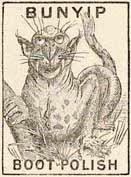THIS LITTLE blog's designated Crikey! peruser is Bob On The Murray, who wades selflessly through the twaddle Eric Beecher markets daily to pseuds, loons, wankers, sprout-suckers and people who think Margaret Simons is qualified to lecture on more than climbing the ivory tower while rubbing sensuously against Jay Rosen. (OK, OK! She also offers a minor elective in how to facilitate hoaxes on ideological enemies and still avow a straight-faced respect for truth). In any case, Bob writes of being busy preparing for Christmas and offers that as his excuse for not noticing Guy Rundle's column on the alleged rise of a neo-fascist racism in European life and politics. Bob is forgiven, but it remains a pity he did not send a more timely alert because the Rundle dispatch in question is a beaut, even by the big puddin's standards.
Give that man a Brazilian
It concerns the latest meshuganah Muslim, the one who killed a lot of innocent Belgians -- except Rundle's screed is not really about that at all, using the Liege massacre only as a springboard to nail what, in Rundleworld, is the real problem. Yes, predictable as poo after curry, the threat is right-wingers and their intolerance, which sees Rundle re-visiting yet again Anders Breivik's rampage. The fact that Rundle has an interest in a new book on Breivik has nothing to do with his efforts to keep the Norwegian in the spotlight. No, nothing at all. Beecher would never stand for that, unless he has targetted the nakedly self-serving as a brand extension to Crikey's well established dill demographic.
The interesting thing about Rundle is, as usual, what he leaves out while attempting to divert attention from a Muslim nutjob in Liege to the (presumably) Christian one in Florence, where two street vendors were killed for the crime of being Africans. According to Rundle, "...the murderous violence emerged from a context in which Europe is held to be 'disappearing', Muslims are spoken of in disgusting racialist terms, and in which extreme measures are spoken of as necessary and inevitable. There was no question that there would be outbreaks of violence such as this after Breivik's massacre [buy Rundle's book to learn more], and there is no doubt that this one will not be the last. Yet, as with the Breivik killing, mainstream journalists are slow to notice a trend that isn't served to them on a plate."
Rundle would be the expert on "not noticing" -- in this case not noticing an interesting little sidlelight to the Liege attack. Before the cuprit was found dead by his own hand, Belgium cops feared he was part of a team.
That turned out not to be the case, but such confusion was understandable. Not far from the massacre site an entire Muslim family was being sentenced for the honour killing of a young woman, who was daughter to two defendants and sister to the two others.She was shot three times by her brother for refusing an arranged marriage.
Take it from Rundle when he says Europe has nothing to fear from its Islamification. All you need to do is follow his lead, buy his book -- and ignore that which might ruffle the author's favoured narrative.

